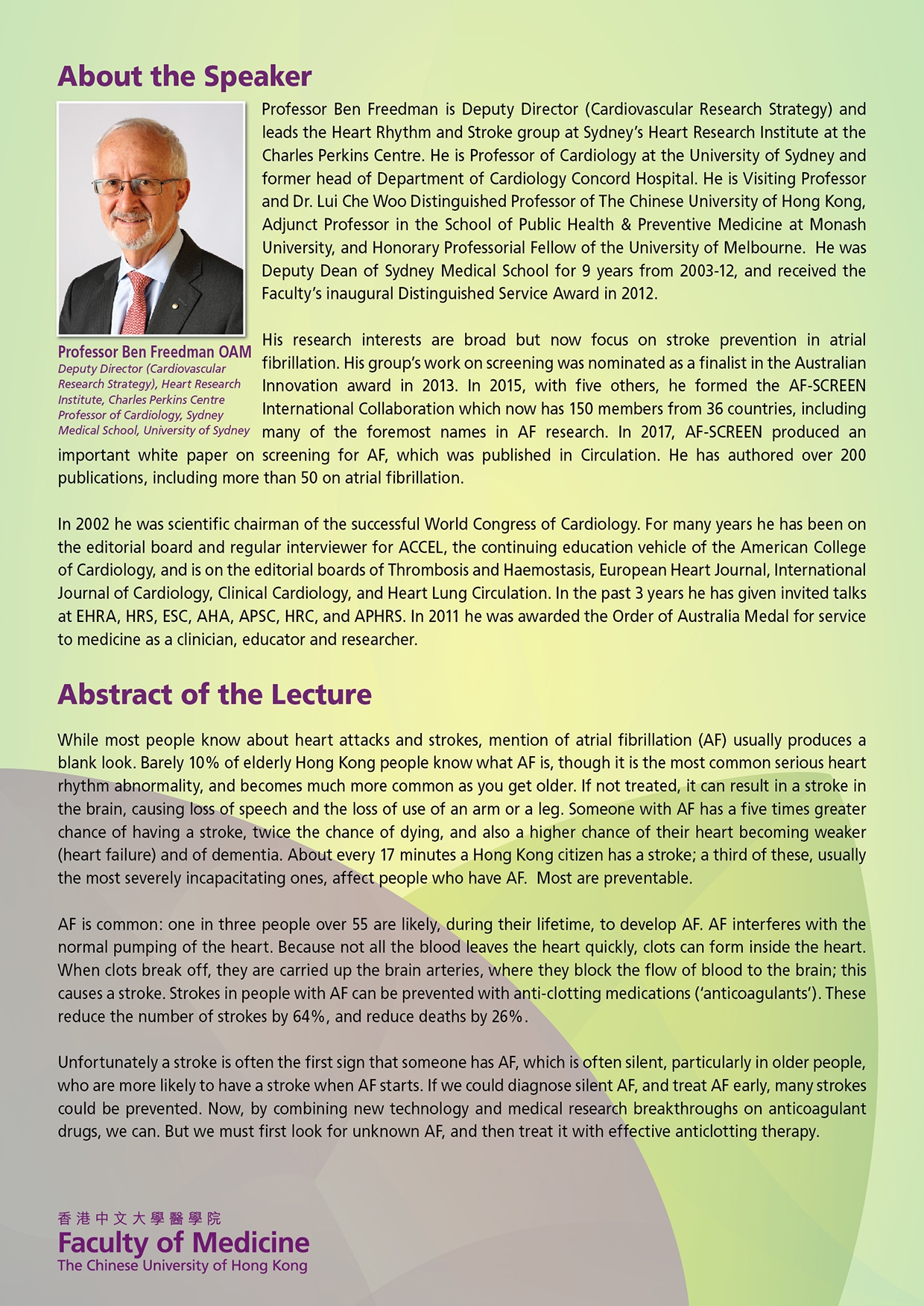活动
吕志和博士创新医学杰出教授公开讲座「心律不正与中风: 我们是否低估了它?」
2018年10月23日
下午 6时30分 至 7时30分
新界沙田威尔斯亲王医院吕志和临床医学大楼二楼演讲厅
Ben Freedman教授
Professor Ben Freedman OAM
MBBS, PhD, FRACP, FCSANZ, FESC, FACC, FAHA
Professor Ben Freedman is the Deputy Director at Sydney’s Heart Research Institute at the Charles Perkins Centre. He is a Professor of Cardiology at the University of Sydney, a Visiting Professor and Dr. Lui Che Woo Distinguished Professor of The Chinese University of Hong Kong. He was also the former Department Head of the Cardiology Concord Hospital and the Deputy Dean of Sydney Medical School from 2003-2012.
For many years he has been the continuing education vehicle of the American College of Cardiology, a regular interviewer for and is on the editorial boards of ACCEL, Thrombosis and Haemostasis, European Heart Journal, International Journal of Cardiology, Clinical Cardiology, and Heart Lung Circulation. In the past 3 years he was invited as guest speaker at EHRA, HRS, ESC and AHA etc.
Focusing on stroke prevention in atrial fibrillation, he formed the AF-SCREEN International Collaboration in 2015, which now has 150 members from 36 countries, including many of the foremost names in AF research. He has authored over 200 publications with more than 50 on atrial fibrillation.
彭洁冰女士 (电话:3943 9876 |电邮:conniepang@cuhk.edu.hk)
While most people know about heart attacks and strokes, mention of atrial fibrillation (AF) usually produces a blank look. Barely 10% of elderly Hong Kong people know what AF is, though it is the most common serious heart rhythm abnormality, and becomes much more common as you get older. If not treated, it can result in a stroke in the brain, causing loss of speech and the loss of use of an arm or a leg. Someone with AF has a five times greater chance of having a stroke, twice the chance of dying, and also a higher chance of their heart becoming weaker (heart failure) and of dementia. About every 17 minutes a Hong Kong citizen has a stroke; a third of these, usually the most severely incapacitating ones, affect people who have AF. Most are preventable.
AF is common: one in three people over 55 are likely, during their lifetime, to develop AF. AF interferes with the normal pumping of the heart. Because not all the blood leaves the heart quickly, clots can form inside the heart. When clots break off, they are carried up the brain arteries, where they block the flow of blood to the brain; this causes a stroke. Strokes in people with AF can be prevented with anti-clotting medications (‘anticoagulants’). These reduce the number of strokes by 64%, and reduce deaths by 26%.
Unfortunately a stroke is often the first sign that someone has AF, which is often silent, particularly in older people, who are more likely to have a stroke when AF starts. If we could diagnose silent AF, and treat AF early, many strokes could be prevented. Now, by combining new technology and medical research breakthroughs on anticoagulant drugs, we can. But we must first look for unknown AF, and then treat it with effective anticlotting therapy.





